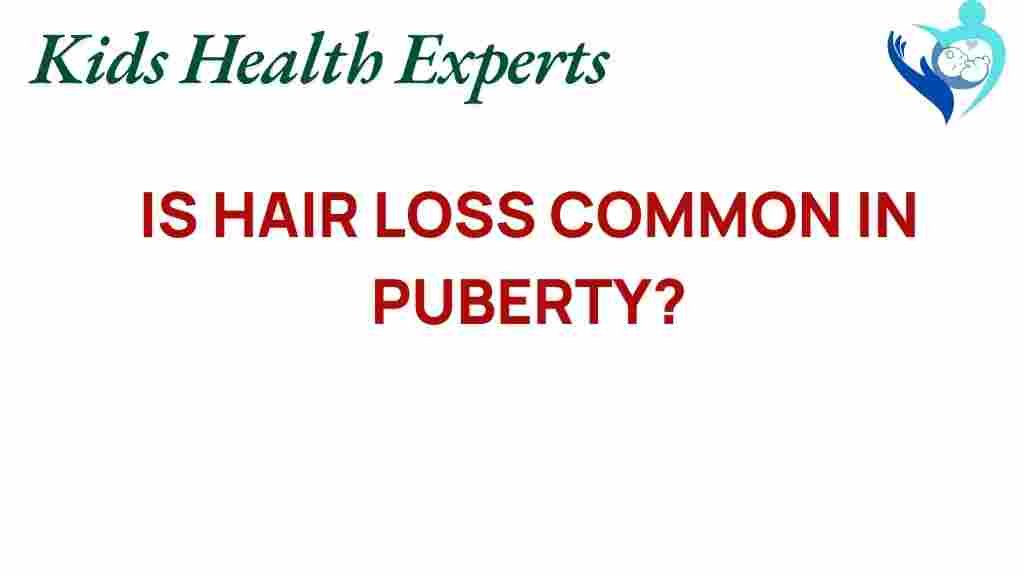Unraveling the Mystery: Is Hair Loss Common During Puberty?
Hair loss during puberty is a topic that raises many questions among adolescents and their parents. As young people transition into adulthood, they experience a whirlwind of physical and emotional changes, which can include fluctuations in hair health. Understanding the connection between puberty and hair loss is crucial for navigating this challenging phase. In this article, we will explore the various causes of hair loss during adolescence, potential treatments, the role of hormones, and the psychological effects that may accompany this experience. We will also provide some troubleshooting tips to maintain healthy scalp health and promote hair growth.
Understanding Hair Loss During Puberty
During puberty, individuals undergo significant hormonal changes that can impact their hair growth cycle. While some level of hair shedding is normal, the extent and nature of hair loss can vary widely among adolescents. This section will delve into the common reasons behind this phenomenon.
The Role of Hormones
Hormones play a pivotal role in hair growth and loss. During puberty, both males and females experience surges in sex hormones, particularly:
- Testosterone: In boys, increased levels of testosterone can lead to changes in hair follicles, sometimes triggering hair loss.
- Estrogen: In girls, estrogen levels rise, which typically helps promote hair growth, but fluctuations can still cause issues.
These hormonal changes can lead to conditions such as androgenetic alopecia, also known as hereditary hair loss, which can begin to manifest during the teenage years.
Common Causes of Hair Loss in Adolescence
Several factors can contribute to hair loss during puberty. Understanding these causes can help in addressing the issue effectively. Some common causes include:
- Genetics: Family history of hair loss can increase the likelihood of experiencing it during puberty.
- Nutritional Deficiencies: A lack of essential nutrients like iron, zinc, and vitamins can lead to weak hair and increased shedding.
- Stress: The emotional and physical stress of adolescence can trigger conditions like telogen effluvium, which causes temporary hair loss.
- Medical Conditions: Conditions such as thyroid disorders and autoimmune diseases like alopecia areata can also affect hair health.
- Hairstyling Practices: Aggressive hair treatments, tight hairstyles, and excessive heat can damage hair and lead to loss.
Psychological Effects of Hair Loss
Experiencing hair loss during puberty can have profound psychological effects on adolescents. Some common emotional responses include:
- Low Self-Esteem: Hair is often associated with identity, and losing it can lead to feelings of inadequacy.
- Anxiety and Depression: The stress of dealing with physical changes can exacerbate feelings of anxiety and lead to depressive symptoms.
- Social Withdrawal: Adolescents may isolate themselves due to embarrassment or fear of judgment from peers.
It is essential to acknowledge these feelings and seek support when necessary. Talking to trusted adults or mental health professionals can help in coping with the emotional aspects of hair loss.
Step-by-Step Process for Managing Hair Loss During Puberty
If you or someone you know is experiencing hair loss during puberty, following a structured approach can help manage the situation effectively. Here’s a step-by-step guide:
Step 1: Identify the Cause
Start by pinpointing the potential causes of hair loss. Consider factors such as:
- Family history of hair loss
- Diet and nutritional intake
- Stress levels and emotional well-being
- Any medical conditions or medications
Step 2: Consult a Healthcare Professional
After identifying potential causes, consult a healthcare provider or dermatologist. They can provide a proper diagnosis and suggest appropriate treatments. This may include:
- Blood tests to check for deficiencies or hormonal imbalances
- Scalp examinations to assess hair and scalp health
Step 3: Consider Treatment Options
Based on the diagnosis, explore various treatment options. Some common treatments include:
- Topical Treatments: Products like minoxidil can help stimulate hair growth.
- Oral Medications: In some cases, hormonal treatments may be prescribed.
- Dietary Supplements: Taking vitamins and minerals can support hair health.
Step 4: Maintain Scalp Health
Good scalp health is crucial for hair growth. Here are some tips:
- Use gentle shampoos and conditioners that do not strip natural oils.
- Avoid excessive heat styling and harsh treatments.
- Keep the scalp clean and well-moisturized.
Step 5: Manage Stress and Mental Health
Finding ways to cope with stress is essential. Techniques such as:
- Mindfulness and meditation
- Regular physical activity
- Counseling or therapy sessions can be beneficial.
Troubleshooting Tips for Hair Loss
Here are some troubleshooting tips for managing hair loss during puberty:
- Track Changes: Keep a journal of your hair loss patterns to share with your healthcare provider.
- Nutrition: Focus on a balanced diet rich in proteins, healthy fats, and vitamins.
- Hydration: Drink plenty of water to keep your body and scalp hydrated.
- Be Gentle: Avoid harsh brushing or pulling on your hair.
For more information on maintaining healthy hair, check out this helpful resource.
Conclusion
Hair loss during puberty can be a distressing experience for many adolescents. By understanding the causes, exploring treatment options, and maintaining good scalp health, individuals can navigate this challenging period more effectively. Remember, hormonal changes are a natural part of growing up, and while hair loss can be common, it is often manageable. Seeking support from healthcare professionals and loved ones can significantly alleviate the psychological impact associated with hair loss. Embrace this transitional phase with knowledge and confidence, and prioritize your overall health and well-being.
For further reading on the effects of puberty on hair health, visit this external link.
This article is in the category Conditions and created by KidsHealthExperts Team
